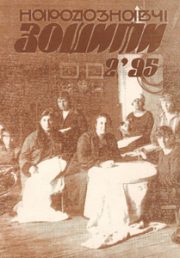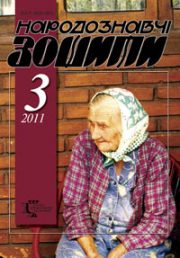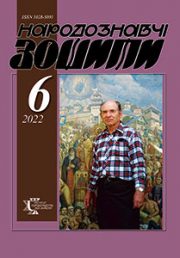The Ethnology Notebooks. 2021. № 6 (162), 1441—1456
UDK [930.25:39](=161.2:71)
DOI https://doi.org/10.15407/nz2021.06.1441
IN BETWEEN THE WORLDS: BOHDAN MEDWIDSKY UKRAINIAN FOLKLORE ARCHIVES
CHERNYAVSKA Maryna
- ORCID https://orcid.org/0000-0003-1655-2734
- Master of Arts in Folklore,
- Master of Library and Information Studies, Archivist,
- Kule Folklore Centre, University of Alberta, Canada,
- Contacts: e-mail: chernyav@ualberta.ca
Abstract. The article analyses knowledge organization in folklore archives on the example of the Bohdan Medwidsky Ukrainian Folklore Archives at the Kule Centre for Ukrainian and Canadian Folklore at the University of Alberta, Canada(Archives). I examine the Archives at the intersection of several disciplines: folkloristics, archival studies, and Ukrainian studies, as well as in relationship to other areas of information studies such as research data management. I discuss the context of the Archives’ establishment, development and operations at a North American university from its founding in the 1970s until today. The impact of the key individuals on the content of archival collections and their organization is examined. I argue that it is extremely important to adopt professional archival description standards, to document processes and workflows, and to participate in the activities of local and international professional associations, both folklore and archival. I detail the challenges of arranging and describing folklore materials and argue that it is necessary to apply hybrid methods of information organization, which in addition to archival standards take into account specifics of fieldwork materials, collected by folklorists in the field. The importance of collaboration between folklorists and professionally trained archivists is emphasized, as well as ethical aspects of the work of folklore archivists and their impact on the shaping of historical records.
Keywords: folklore archives, folkloristics, archival studies, Ukrainian folklore diaspora, interdisciplinarity, Ukrainian Canadians, Ukrainian research institutions in Canada, institutional history.
Received 22.09.2021
REFERENCES
- Hall, S.A. (2010). Archives and Archiving. Folklore: An Encyclopedia of Beliefs, Customs, Tales, Music, and Art (Vol. 1, pp. 140—146). ABC-CLIO; LLC.
- Medwidsky, B. (1998). Huculak Chair of Ukrainian Culture and Ethnography at the University of Alberta: Contextual Analysis. Collected Papers on Ukrainian Life in Western Canada (Vol. 3, pp. 40—87). Edmonton: Shevchenko Scientific Society of Canada [in Ukrainian].
- Nahachewsky, A. (2007). Kule Centre for Ukrainian and Canadian Folklore. Ethnologies, 29 (1—2), 331—336.
- Nahachewsky, A., & Kononenko, N. (2012). Peter and Doris Kule Centre for Ukrainian and Canadian Folklore. Folk Art and Ethnology, special issue, 5, 91—94 [in Ukrainian].
- Nahachewsky, A. (2005). Local culture and diversity on the prairies: a project report / Culture locale et diversitu dans les prairies: rapport. Edmonton: Friends of the Ukrainian Folklore Centre.
- Klymasz, R., & Medwidsky, B. (1983). Macaronic Poetics in Ukrainian Canadian Folklore. Canadian Slavonic Papers, 25 (1), 206—215.
- Nahachewsky, A. (2009). Kule Folklore Centre. Champions of Philanthropy: Peter and Doris Kule and their Endowments (Pp. 71—90). Edmonton and Ottawa: Kule Endowment Group.
- Fulton, P. (2003). The Memorial University of Newfoundland Folklore and Language Archive. Canadian Folk Music, 37 (1), 9—12.
- Foty, N. (2011). Bohdan Medwidsky Ukrainian Folklore Archives of the Peter and Doris Kule Centre for Ukrainian and Canadian Folklore at the University of Alberta. Visnyk of the Lviv University, 10, 253—258 [in Ukrainian].
- (2012). Bohdan Medwidsky Ukrainian Folklore Archives (hereafter — BMUFA). Coll.0011. BMUFA Acquisition Strategy.
- BMUFA. Coll.0024, UF2014.002. Interview with Dr. Andriy Nahachewsky about the Bohdan Medwidsky Ukrainian Folklore Archives.
- Santino, J. (2010). Popular Culture. Folklore: An Encyclopedia of Beliefs, Customs, Tales, Music, and Art (Vol. 3, pp. 1008—1013). ABC-CLIO; LLC.
- Yopyk, H.A. (1982). Ukrainian Canadian Archives and Museum of Alberta: Artifacts of Ukrainian Pioneers of Alberta. Edmonton, Alberta [in Ukrainian].
- Kolovos, A. (2010). Archiving Culture: American Folklore Archives in Theory and Practice. PhD dissertation (Bloomington, Indiana University).
- About. Kule Folklore Centre website. Archived on May 15 2013. Retrieved from: http://web.archive.org/web/20130515183816/http://www.ukrfolk.ualberta.ca/en/About.aspx
- About. Kule Folklore Centre website. Retrieved from: https://www.ualberta.ca/kule-folklore-centre/about/index.html
- Chernyavska, M. (2018). The Contested Identity of Folklore Archives: Folkloristics and Archival Studies at a Crossroads. Visions and Traditions: Knowledge Production and Tradition Archives (Pp. 24—40). Helsinki: Academia Scientiarum Fennica.
- American Folklore Society. Brenda McCallum Prize. Retrieved from: https://americanfolkloresociety.org/our-work/prizes/brenda-mccallum-prize/
- Dillon, J. (2019). Towards an Archive of Irish Folklore: Establishing Practices for the Collection and Description of Folk Tradition in Ireland, 1927—1942. Master thesis (University College Dublin).
- Ukrainian Canadian Congress — Alberta Provincial Council. UCAMA Project: Save the Archive and Collections. Community Report. December 9, 2020. Retrieved from: https://uccab.ca/wp-content/uploads/2020/12/COMMUNITY-UCC-APC-UCAMA-Report-1.pdf
- Matiash, I. (2010). Archival Ukrainica in Canada: A Guide. Kyiv: State Committee on Archives of Ukraine, Ukrainian Research Institute of Archives and Records Management. Canada: Canadian Institute of Ukrainian Studies [in Ukrainian].
- Toelken, B. (1996). The Dynamics of Folklore. Logan, Utah: Utah State University Press.
- Ben-Amos, D. (1970). University of Pennsylvania Folklore Archives: A Progress Report. Keystone Folklore Quarterly, 15 (3), 148—157.
- Nahachewsky, A., & Mayerchyk, M. (2010). The Characteristics of Ukrainian Folklore Studies in Canada. Ethnology Notebooks, 3—4, 239—309 [in Ukrainian].
- Kolovos, A. (2004). Contextualizing the Archives. Folklore Forum, 35 (1—2), 18—28.
- McNeill, L.S. (2013). Folklore Rules: A Fun, Quick, and Useful Introduction to the Field of Academic Folklore Studies. Logan, Utah: Utah State University Press.
- Duranti, L., & Franks, P.C. (Eds.). (2015). Encyclopedia of Archival Science. Lanham; Maryland: Rowman & Littlefield.
- Yeo, G. (2013). Archives and Records in Cyberspace. Archives & Records, 34 (2), 214—234.
- Sims, M.C., & Stephens, M. (2013). Living Folklore: An Introduction to the Study of People and Their Traditions. 2nd edition. Logan; Utah: Utah State University Press.
- Ben-Amos, D. (1993). «Context» in Context. Western Folklore, 52 (2/4), 209—226.
- Pollard, R.A. (2001). The Appraisal of Personal Papers: A Critical Literature Review. Archivaria, 52, 136—150.
- Hobbs, C. (2001). The Character of Personal Archives: Reflections on the Value of Records of Individuals. Archivaria, 52, 126—135.
- Honko, L. (Ed.). (2000). Thick Corpus and Organic Variation: Introduction. Thick Corpus, Organic Variation and Textuality in Oral Tradition. Studia Fennica Folkloristica 7 (Pp. 3—28). Helsinki: Finnish Literature Society.
- Corsaro, J., & Taussig-Lux, K. (1998). Folklore in Archives: A Guide to Describing Folklore and Folklife Materials. New York: New York Folklore Society.






